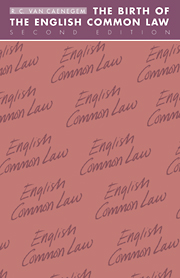3 - The jury in the royal courts
Published online by Cambridge University Press: 05 June 2012
Summary
‘Praecipio ut recognosci facias’
Ordeals, compurgation and juries were the essence of the law of evidence in the twelfth century. Some readers, who have leafed through old Treatises on Evidence – by W. Nelson or Sir Geoffrey Gilbert, or nearer to us, by S. M. Phillips, Sir James Stephen or J. Thayer – may imagine that a chapter on evidence must be so full of technicalities as to frighten even the hardiest student away from ‘the barren fields of law books’. This is not necessarily so. On the contrary, in the history of evidence the interaction of general culture and legal ideas can be followed most clearly. It is a field that belongs to psychological as well as legal history. It demonstrates the true position of the law in the general context of civilization: not as a marginal, abstruse technique of interest to specialists only, but part and parcel of the culture of any given period and one of its most important elements. The history of modes of proof does, of course, throw light on legal thinking and judicial organization, but it also illuminates the mentality, the attitude towards the supernatural and other aspects of the psychology of ordinary people – a very precious source indeed for those remote centuries where information is hard to come by. We know of many civilizations which have moved from ordeals to rational modes of proof, but I know of none where the transformation is as well documented as in Europe in the twelfth and thirteenth centuries.
- Type
- Chapter
- Information
- The Birth of the English Common Law , pp. 62 - 84Publisher: Cambridge University PressPrint publication year: 1988
- 1
- Cited by



